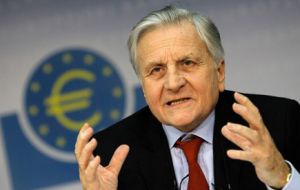MercoPress. South Atlantic News Agency
Euro zone raises interest rate fearing inflation; “sorry peripheral countries”
 Trichet’s ‘balancing act’ could mean the start of a series of rates increases
Trichet’s ‘balancing act’ could mean the start of a series of rates increases Euro-zone interest rates have been raised to 1.25% from the record low of 1% by the European Central Bank (ECB). Interest rates had been held at 1% for just under two years following the financial crisis and global recession.
ECB president Jean-Claude Trichet said on Thursday that the rate rise was in response to the risk of accelerating inflation, and added that rates were still very low. He called the decision a “balancing act” amid concern the move worsens debt problems for Portugal and others.
“The hike is unwelcome for peripheral countries, but arguably the core member states were in need of this move already some time ago” said Mr Trichet in a nod to the differing economic fortunes of the Euro-zone members.
“In that sense, the timing of the increase is a balancing act, which is part and parcel of the one-size-fits-all monetary policy”.
Germany has enjoyed a strong rebound in growth, led by an export boom. In contrast, the economies of Greece, Ireland, Portugal and arguably Spain remain trapped by large debts, high unemployment, weak consumer spending and poor competitiveness.
Mr Trichet confirmed that the ECB had “encouraged the Portuguese authorities to ask for support” when questioned about its role in Portugal's decision to request a bail-out. On Wednesday, Portugal's prime minister said he would ask for financial assistance from the European Union.
“The adjustment of the current very accommodative monetary policy stance is warranted in the light of upside risks to price stability that we have identified in our economic analysis. While our monetary analysis indicates that the underlying pace of monetary expansion is still moderate, monetary liquidity remains ample and may facilitate the accommodation of price pressures”, said Trichet in his official release before questions.
The ECB thus becomes the first of the world's major central banks to start raising rates after the global recession and is an indication that it is now more concerned about inflation than slow growth.
“We did not decide today that it was the first in a series of interest rate increases,” said Trichet in response to a question at the press conference.
The Euro exchange rate was volatile during the speech as investors tried to make sense of his comments, before moving decisively lower against the dollar.
Trichet said that the decision will contribute “to keeping inflation expectations in the Euro area firmly anchored in line with our aim of maintaining inflation rates below, but close to, 2% over the medium term; such anchoring is a prerequisite for monetary policy to contribute to economic growth in the Euro area”.
However he said that with uncertainty remaining elevated, “recent economic data confirm that the underlying momentum of economic activity continues to be positive” and the ECB will continue “to monitor very closely all developments with respect to upside risks to price stability”.
The increase in Euro zone interest rates had been widely expected by markets and had been expected to mark the start of a series of rate rises by the ECB. The European Commission recently upgraded its inflation forecast for the Euro zone to 2.2%, above the ECB target.
The bank also raised another reference rate - the marginal lending rate - to 2% and its overnight deposit rate to 0.5%. Analysts said the ECB was concerned about the impact of rising oil and commodity prices on inflation.
Nevertheless there is uncertainty about how far rates will rise since further rises could risk damaging growth in the Euro zone weaker economies such as Ireland, Greece, Portugal and even Spain.
“I think it is the start of a series but I think [ECB President] Trichet... will try to temper any market expectations, which are already priced in, of further hikes to come,” said Lloyds' interest rate strategist, Eric Wand.
The interest rate rise was also anticipated by banks that have raised lending rates to each other since the start of the year.




Top Comments
Disclaimer & comment rules-

Read all commentsI am from East Germany...I saw and lived in both systems ( Capitalist--Socialist) ,sometimes I miss our old Socialist regime..
Apr 07th, 2011 - 07:38 pm 0I saw -Hungary + Czech +Poland- , all are vapid !
I went to US in two times 2004/Fort Worth...2008/Miami
terrible ..you can live in ( debt burden +guns concerning+no job guarantee) ...if you can .!
Capitalist Countries have no any serious managers ,admin ..
but full of bogus degenerated popular culture characters...
Commenting for this story is now closed.
If you have a Facebook account, become a fan and comment on our Facebook Page!